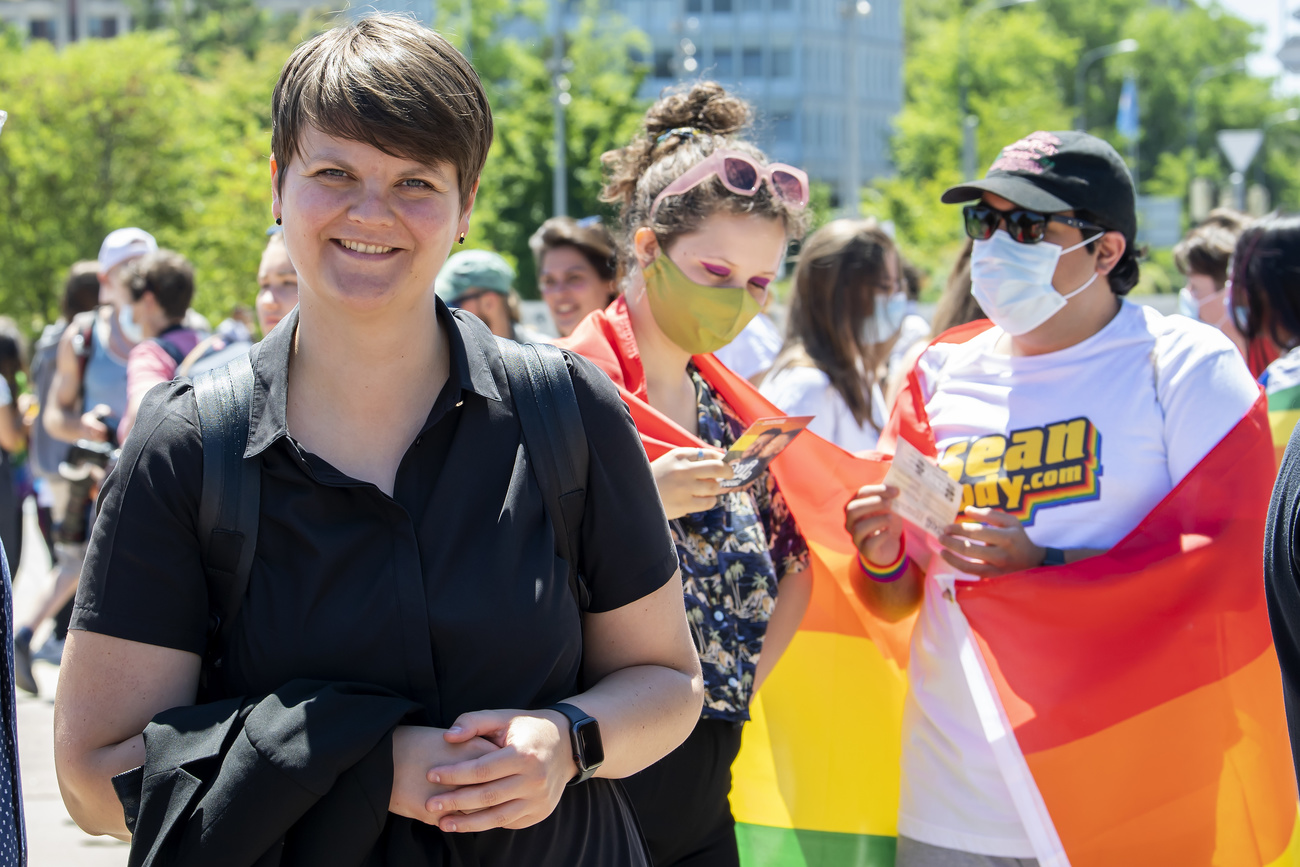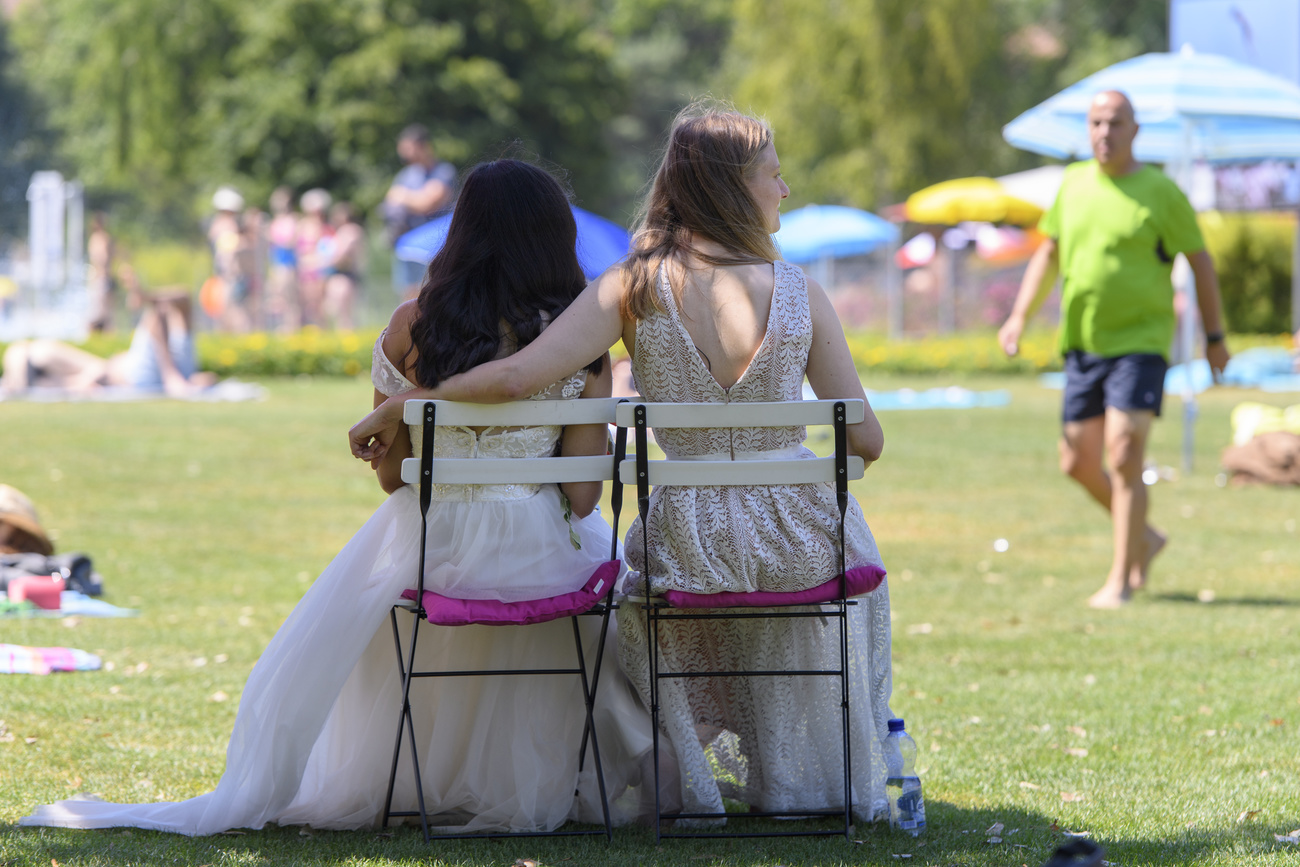
‘Marriage for all is a huge step on the road to equality’

Following seven years of parliamentary debate, the Swiss people will vote on September 26 to determine whether the right to marry should be extended to same-sex couples. Olga Baranova, head of the “marriage for all” campaign, says the change is necessary to end “baseless discrimination”.
On September 26, Swiss voters will decide whether gays and lesbians have the right to marry and found a family. Those in favour of “marriage for all” are on a collision course with proponents of Christian values and the traditional family.
Supporters of the initiative, like Baranova, say the vote will be an opportunity to make up ground regarding the rights of LGBTIQ people (lesbians, gays, bisexuals, transgender, intersex and queer). Voters will decide on a draft law to grant civil marriage to all, including access to medically assisted reproduction for female couples.
SWI: What does marriage for all represent for the LGBT community?
Olga Baranova: It’s a huge step on the road to equality. Symbolically, civil marriage for all is a recognition of the acceptance that LGBT people have already gained within society. It’s also about legal recognition: homosexual couples will have the same protections and rights as heterosexual couples. Today, the absence of civil marriage for all amounts to discrimination that is completely baseless.
SWI: Registered partnerships for lesbian and gay couples already bestow certain rights that are the same as for marriage, such as the possibility of choosing a common name or receiving a share of a partner’s inheritance or pension. What will having the right to marry change?
O.B.: Concretely, it means non-Swiss partners in a same-sex couple will be able to access facilitated naturalisation – a faster and less expensive process – as is the case with heterosexual marriages. Also, female couples will be able to access medically assisted procreation (MAP). Two women could then be recognised as mothers upon their child’s birth, as long as they have used a sperm bank officially recognised in Switzerland.
SWI: This is precisely the point criticised by opponents of marriage equality. They say opening MAP to lesbian couples is equivalent to neglecting the well-being of the child because it violates the right to knowing one’s origins. What is your response?
O.B.: The position doesn’t make sense. Marriage for all gives access to assisted reproduction to female couples in Switzerland. The Swiss law on the matter is very clear: when a child reaches 18, they have the option of learning the identity of the sperm donor. But female couples have not waited for the Swiss to authorise access to assisted reproduction: many go abroad to do it, and, unlike in Switzerland, certain countries authorise anonymous sperm donation. So it’s the current situation which is more likely to violate the rights of the child.
SWI: Will marriage for all pave the way to surrogacy for gay couples, as opponents claim?
O.B.: Absolutely not. They are pretending this law says something that it does not. Surrogacy is illegal for everyone in Switzerland. Besides, it’s important to remember that the issue of surrogacy is not primarily an LGBT issue. An overwhelming majority of couples who travel abroad to seek a surrogate are heterosexual couples. So don’t involve the LGBT community in something that doesn’t concern them in the first place.
SWI: During the parliamentary debates, some politicians argued that the constitution should be amended. Will a simple legislative change, as is proposed, really be sufficient to introduce such a major societal change?
O.B.: Significant social change doesn’t have to come from the constitution. The vast majority of experts consulted during the seven-year parliamentary process said the Swiss constitution absolutely does not exclude marriage for everyone.

More
Equality versus tradition: Swiss to vote on the future of marriage
SWI: After marriage for all will homosexuals have achieved equality, or will other demands follow?
O.B.: There will always be demands – as there are for women and for all people who find themselves on the wrong side of the distribution of power in our society. LGBT groups will continue to fight, notably against hate crimes. Marriage for all will not solve everything. It does not, for example, deliver absolute equality for female couples who receive a sperm donation from a friend. In this case, only the biological mother is recognised upon the birth of the child. These debates will still occur, and the LGBT community will continue to fight for equality.
Gérard Pella opposes extending marriage rights to same-sex couples. He explains why in an interview:

More
‘Marriage for all just creates new kinds of inequality’
Translated from French by Sophie Douez.

In compliance with the JTI standards
More: SWI swissinfo.ch certified by the Journalism Trust Initiative





























You can find an overview of ongoing debates with our journalists here . Please join us!
If you want to start a conversation about a topic raised in this article or want to report factual errors, email us at english@swissinfo.ch.